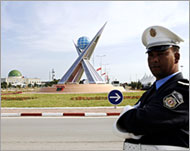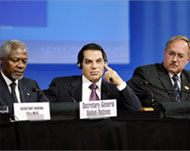Annan: Let internet help world’s poor
UN Secretary-General Kofi Annan has called for the internet and information technology to be used to help build a better life for people in some of the world’s poorest countries.

Annan warned the 170 countries and some 23,000 scheduled participants from government and industry at the World Summit on the Information Society (WSIS) in Tunis that “for far too many people, the gains remain out of reach”.
“There is a tremendous yearning, not for technology per se (in itself), but for what technology can make possible,” he told the opening ceremony on Wednesday in the Tunisian capital, urging participants to “respond to that thirst”.
“This summit must be a summit of solutions” to build “bridges for a better life” in poor countries.
Host President Zine El Abidine Ben Ali said he hoped the gathering “will mark a truly new beginning for a just, balanced and supportive information society”.
The UN-organised summit is being attended by a number of government leaders, mainly from Africa, but only a few from rich nations.
Split averted
Earlier, an eleventh-hour deal avoided a potentially damaging split between the US and the rest of the world over control of the internet after diplomats agreed to work towards enhanced international cooperation.
Negotiators struck an agreement on key clauses on internet governance for endorsement during the summit.
 |
|
Annan: Internet’s gains remain |
But the deal reached late on Tuesday left intact single-handed US control over the private body that oversees the key technical and administrative roots of the global network, despite the challenges contributing to a three-year deadlock.
Officials had warned that the internet could have been torn into competing or disconnected networks if the split had continued.
The agreement set up two parallel tracks of multilateral talks, including an open-ended process “towards enhanced cooperation (by) relevant international organisations” on oversight and public policy issues.
The new process will be triggered by UN Secretary-General Kofi Annan in the first quarter of 2006, according to the final draft, but it set no target for an outcome.
Despite sharp criticism, the private, non-profit, Internet Corporation for Assigned Names and Numbers (ICANN) was expected to have its tender renewed by the US government next summer.
Unique role
The accord “preserved the unique role of the US government in ensuring the reliability and stability of the Internet”, top US negotiator David Gross said on Wednesday.
“It took no action with regard to existing institutions including ICANN. It created no new international organisations,” added Gross, the US coordinator for international communications and information policy.
 |
|
Some 50 government leaders |
Countries such as Iran and China had sought UN oversight of ICANN or internet governance, while the European Union wanted to water down US powers, but Washington firmly objected.
The other track creates an Internet Governance Forum (IGF) for an initial five-year term to hold talks on all internet issues, including problems such as as spam, cyber crime and computer viruses.
After a final session which saw US, Chinese and Iranian diplomats swapping suggestions for new wording, officials applauded efforts to widen the scope of formal discussion to industry and civil society.
The IGF, which Greece has offered to host, will also be allowed to “build on the existing structures of internet governance” but has no concrete powers.
Decision welcomed
Business groups at the summit said they were ready to take part in the forum. In a statement, a coordinating body close to the International Chamber of Commerce also welcomed “the continued commitment to the private sector-led technical management of the internet”.
Washington’s critics had warned that no single nation could maintain control over top-level domain or country names – such as .cn, .fr and .uk – without the threat of their being misused to block a foe’s access to the Internet for political or economic reasons.
 |
|
Kofi Annan and Tunisia president |
The US retorted that regimes that do not allow freedom of speech might instead be in a position to have leverage over the internet.
The summit on Wednesday was also marked by sharp warnings that freedom of speech was a core component of a modern information society, following incidents involving journalists and campaigners in the Tunisian capital in recent days.
“For myself, it goes without question that here in Tunis, inside these walls and outside, anyone can discuss quite freely,” said Swiss President Samuel Schmid, sitting alongside the Tunisian head of state.
“For us it is one of the conditions sine qua non (essential) for the success of the international conference,” he added.
Hunger strike
Seven Tunisian hunger strikers also made a public appeal to Annan to defend freedom of speech, while Iranian Nobel Peace prize winner Shirin Ebadi called for international monitoring to stop political repression on the internet.
Tunisian authorities have said two suspects are being questioned by an investigating magistrate in connection with the assault on Friday on a French journalist.
|
“It is striking that the 400,000 citizens of Luxembourg have more internet access than the 800 million residents in Africa” Shashi Tharoor, |
Groups advocating freedom of speech said they had been harassed.
The gathering’s ambition to boost economic and social development in poor countries revolves around a pledge under the UN’s Millennium Development Goals to connect all the villages of the world to the Internet by 2015.
“It is striking that the 400,000 citizens of Luxembourg have more internet access than the 800 million residents in Africa,” the UN Under Secretary for Communications, Shashi Tharoor, said.
Some 800,000 “villages,” mainly in poor nations, still need to be connected in the next decade, according to the UN’s International Telecommunication Union (ITU).
The cost of the effort, $1 billion, represents 1% of the annual global investment in mobile telephone connections.
Not political
“The hurdle here is more political than financial,” Annan told the summit on Wednesday. “These assets – these bridges to a better life – can be made universally affordable and accessible,” he added.
Nigerian President Olusegun Obasanjo and Senegalese counterpart Abdoulaye Wade appealed for more backing for a Digital Solidarity Fund that has so far garnered 5.5 million euros.
 |
|
A number of African leaders are |
Obasanjo said the global economy was now driven by information technology.
“Unless those that are now excluded from the benefits of the information revolution are brought on board, our efforts to achieve sustainable development as outlined in the Millenium Development Goals, will continue to elude us,” he added.
Rich nations believe that developing nations must also develop the business and regulatory environment in their own countries to attract private investment and some existing aid.
“The challenge to the developing world is now to make sure they have the infrastructure, rules, legal processes and the market systems to attract the investment of the technologies that we see on display at the summit,” said US Assistant Secretary for Commerce Michael Gallagher.